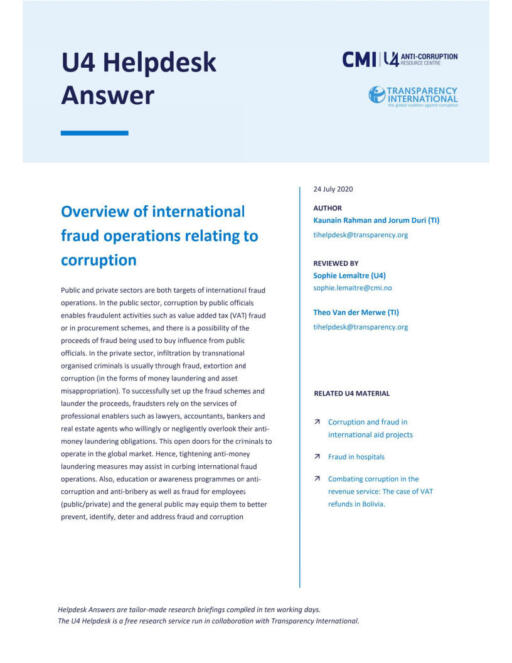
This Anti-Corruption Helpdesk brief was produced in response to a query from a U4 Partner Agency. The U4 Helpdesk is operated by Transparency International in collaboration with the U4 Anti-Corruption Resource Centre based at the Chr. Michelsen Institute.
Query
Please provide an overview of the evidence concerning international fraud operations as these relate to corruption. What, if any, overlap is there between corruption and private sector fraud? To what extent are anti-corruption measures and anti-money laundering safeguards relevant to efforts to tackle fraud?
Summary
Public and private sectors are both targets of international fraud operations. In the public sector, corruption by public officials enables fraudulent activities such as value added tax (VAT) fraud or in procurement schemes, and there is a possibility of the proceeds of fraud being used to buy influence from public officials. In the private sector, infiltration by transnational organised criminals is usually through fraud, extortion and corruption (in the forms of money laundering and asset misappropriation). To successfully set up the fraud schemes and launder the proceeds, fraudsters rely on the services of professional enablers such as lawyers, accountants, bankers and real estate agents who willingly or negligently overlook their anti-money laundering obligations. This open doors for the criminals to operate in the global market. Hence, tightening anti-money laundering measures may assist in curbing international fraud operations. Also, education or awareness programmes on anti-corruption and anti-bribery as well as fraud for employees (public/private) and the general public may equip them to better prevent, identify, deter and address fraud and corruption.
Contents
- Background
- Fraud and corruption aimed at the public sector
- Overlap between corruption and private sector fraud
- Professional enablers of fraud operations
- Connection between fraud and money laundering
- References
Main points
- Various instances of internal and external fraud that involve abuse of power link the phenomenon with corruption.
- In the public sector, fraudsters use corruption to minimise law enforcement or operational risks by public officials in schemes such as VAT fraud or procurement fraud.
- Corruption and fraud in the private sector often overlap when it comes to white-collar crimes.
- Professional enablers such as bankers, real estate agents, notaries, lawyers, accountants and corporate service providers may willingly or negligently assist in setting up fraudulent schemes or laundering the proceeds of fraud.
- Money laundering and fraud are connected in the sense that criminals who commit fraud eventually need to monetise that information and launder the proceeds so that funds appear legitimate.
Authors
Kaunain Rahman and Jorum Duri (TI), [email protected]
Reviewers
Sophie Lemaître (U4), [email protected] and Theo Van der Merwe (TI), [email protected]
Date
28/09/2020

